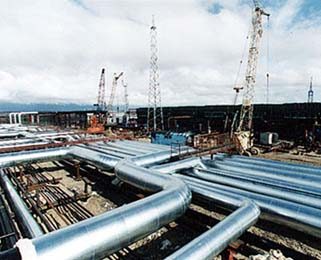
MOSCOW FORCING CZECH REPUBLIC TO GUESS AS TO REASONS BEHIND OIL SUPPLY CUT
Publication: Eurasia Daily Monitor Volume: 5 Issue: 143
By:

Earlier this month, Russia suddenly reduced crude oil deliveries to the Czech Republic through the Druzhba pipeline, from 500,000 tons down to 300,000 tons (see EDM, July 15). The Czech Republic is coping with the situation, at least for now, thanks to its access to an alternative source of supply. Such access makes the Czech Republic a unique exception in Central and Eastern Europe and was made possible by the country’s more westerly geographic location.
Other countries were less favored by location in their efforts to diversify energy supplies away from the Druzhba system. Russia terminated deliveries by pipeline to Lithuania practically overnight in July 2006, using a minor accident as an excuse to permanently close the pipeline. Moscow has refused ever since to answer Lithuanian and European Union queries about the nature of that mishap and possible repair of the line. But it was obvious that the move was retaliation against the privatization of Lithuania’s Mazeikiai refinery by the Polish PKN Orlen, winner against Russian companies in that contest.
In 2006 and 2007, Russia had cut the pre-contracted oil deliveries through the Druzhba system to Germany for brief periods of time, also by surprise and without credible explanations. This recurring situation proves Lithuania right to have amended the European Commission’s negotiating mandate on a new EU-Russia partnership agreement. One of the Lithuanian amendments would establish a linkage between progress in the negotiations and Russia’s behavior as an energy supplier to EU countries.
Moscow is now withholding any decent explanation about the deep cut in oil deliveries to the Czech Republic. Such lack of transparency is at least as significant as the supply cut itself. Forcing the targeted country to guess as to the reasons behind the supply cut is a key element in Moscow’s manipulation of energy supplies for intimidation, retaliation, or asset takeovers.
Moscow has vaguely mentioned “technical reasons,” “extraction problems,” or the oil companies’ “private decisions” as possible explanations for the cut in supplies to the Czech Republic. It has yet to provide specifics or show scruple about the apparent non-observance of contracts. Such opacity generates speculation about Moscow’s real motives.
The “technical reasons” can not refer to pipeline malfunctioning, inasmuch as other countries connected to the Druzhba system are not affected. More likely, the cut may be related to Moscow’s strategic decision to shift a large part of the oil volume from the westbound Druzhba pipeline into the northbound Baltic Pipeline System, for shipment onward by tankers (bypassing the three Baltic states). This shift is planned to be implemented during the next few years, potentially affecting all countries along the Druzhba system. Compared to other countries, the Czech Republic is more vulnerable because it is situated at the end of a Druzhba spur. Consequently, as the Czech ambassador-at-large for energy security, Vaclav Bartuska, notes, deliveries through Druzhba may well become unreliable in coming years (Hospodarske Noviny, July 25).
The purported “extraction problems” may refer to Russia’s stagnant crude oil extraction, which actually declined by 0.4 percent year-over-year in the second quarter of 2008. The U.S. special envoy for energy affairs, C. Boyden Gray, called for urgent measures to increase extraction during his latest visit to Russia (Interfax, July 23). Hounding out such companies as BP, however—after the forcible divestiture of Royal Dutch Shell of multi-billion-dollar worth of assets last year—will not help increase Russian extraction.
The oil companies’ “private decisions,” it turns out, are Tatneft’s and Bashneft’s switch of oil export volumes to Turkey, where refining of their crude is said to be more profitable for those Russian companies. True or not, this argument still does not answer the issue of delivery obligations under contracts. Russian officials have also hinted that commercial conflicts with intermediary traders caused the supply interruptions (Pravo, CTK, July 15, 16; Interfax, July 21).
The “private” nature of those decisions seems questionable, however. Russian Prime Minister Vladimir Putin instructed the Presidium of the Cabinet of Ministers on July 21 to work with all parties and take measures to avoid disruptions in supplies. However obscure and seemingly disingenuous, Putin’s remarks at least hinted quite clearly that the government could overrule the oil companies’ ostensibly “private” decisions. In that meeting, Deputy Prime Minister Igor Sechin faulted the Czech Republic for having “for many years declined to sign an intergovernmental memorandum on the terms and conditions of Russian oil deliveries” (Interfax, July 21, 22). Sechin’s remark seems to suggest that Moscow could in the short term restore the full-volume supplies, subject to an agreement on terms and conditions to Moscow’s satisfaction.
Moscow denies any political motives behind the supply cut. Publicly at least, Prague accepts that denial without much questioning. According to Bartuska, “There is currently no reason not to believe the Russian side when it says that the [supply cut], which came immediately after the signing of the treaty on stationing a US radar on our territory, does not have a political motive… If the Russians wanted to push us to the wall, they would do it rather through natural gas” (Pravo, July 23). Speculation continues to center on the signing of the U.S. radar agreement as the proximate cause of the Russian supply cut, but there is no clear evidence of causality. Moreover, speculation about political causes—whether well-founded or not—can distract attention from structural causes internal to Russia, such as stagnant oil production, or a political decision to hold back on extraction.




